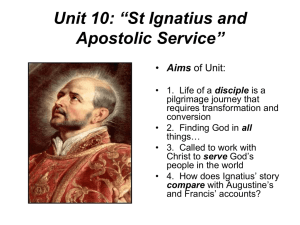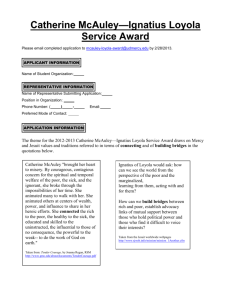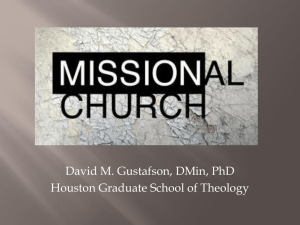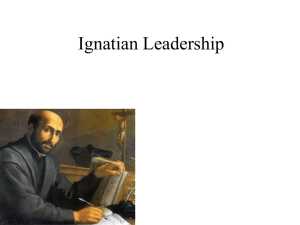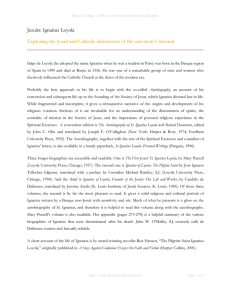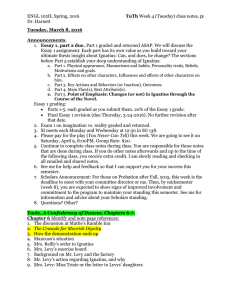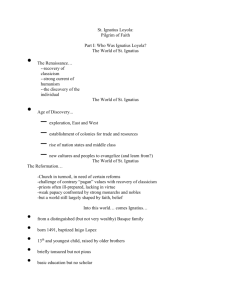sophomore_year_unit_10_ignatius_and_jesuit_education
advertisement
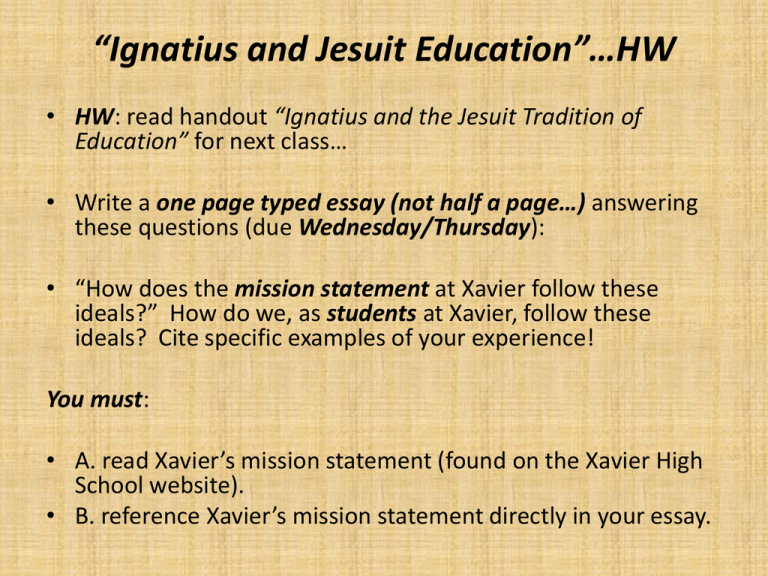
“Ignatius and Jesuit Education”…HW • HW: read handout “Ignatius and the Jesuit Tradition of Education” for next class… • Write a one page typed essay (not half a page…) answering these questions (due Wednesday/Thursday): • “How does the mission statement at Xavier follow these ideals?” How do we, as students at Xavier, follow these ideals? Cite specific examples of your experience! You must: • A. read Xavier’s mission statement (found on the Xavier High School website). • B. reference Xavier’s mission statement directly in your essay. Ignatius and Jesuit Education • • • • Three main ideals: 1. Spirituality 2. Studies 3. Service • These three ideals are all components of our definition of a disciple… A disciple is… • “a student in communion with others, striving for a close relationship with God, and one who is called and given the courage to serve…” • How does Ignatius embody this definition? Ignatius and Jesuit Education: “Spirituality” • Spiritual Exercises = designed for others to discern God’s will… • Ignatian Pedagogical Paradigm: context, experience, reflection, action, and evaluation Ignatius and Jesuit Education: “Spirituality” • “1st Principle and Foundation of the Spiritual Exercises:” • The goal of our life = live with God… • Out of love, God gave us life…created us! • All things are gifts from God…so that we can know God more easily… • And give love to others more readily… freely choose to give love! 1st Principle and Foundation… • “we must make ourselves indifferent to all created things…we should not prefer health to sickness, riches to poverty, honor to dishonor, a long life to a short life. The same holds for all other things...” • Another component to consider: INDIFFERENCE…what does this mean? Indifference… • Key Ignatian spiritual concept meaning: Not the idea of not caring… It is unbiased and impartial… Not bound to things…not living for the means, but rather for the END GOAL! Indifference… • If we are indifferent, then we have real freedom, because we are able to choose those things which will lead us to serve the Lord best, which is the end goal! • Indifference leads to making choices for the greater good, and not for our individual goods = MAGIS! (striving for “the more” = more love…) Ignatius and Jesuit Education: “Spirituality” “Finding God in all things…” • Both transcendent and immanent understanding of the divine… • Where can we derive this belief from? • Creation God is pleased… all if is good… then created in the image and likeness of God… • And we must love and care for all! Ignatius and Jesuit Education: “Studies” • Rigorous course of academic study • Well-formed thinkers…future leaders! • Strive for excellence… • JSEA: open to growth, loving, religious, intellectually competent, committed to doing justice • Well – formed = “Cura Personalis”…what does this mean? “Cura Personalis: A key Ignatian Ideal” • Means the “care of the individual person”… • Calls for personal relationships… • …WE can learn from you, the student, just as you can learn from us!! • Attention to the unique needs of others, circumstances, concerns, and the respect of all the different/diverse gifts one may have… • And the call to cultivate/enhance those gifts and talents… Ignatius and Jesuit Education: “Service” • “for the greater glory of God…AMDG!” • “MAGIS” = means the more…strive to be more than ordinary and willed to love others! • “love ought to manifest itself more by deeds than by words…” • What does this mean? What are we called to do? To conclude... • Why is love so important? • How does love fit into the themes of Ignatian Education and thought? • How are we called to love? What do we love? Pedro Arrupe… “Falling in Love” St Ignatius of Loyola • The life of a disciple of Christ is a pilgrimage journey that requires constant efforts at: 1. Renewal 2. Transformation 3. Conversion St Ignatius of Loyola • “renewal, transformation, conversion…” – Why must we have constant renewal? – Always being distorted by external world • Example of modern renewal? – Examples… • Communal Mass • Personal Penance • As Christians this is what we are called to do: 1.Enter a new life, identity, to become part of the new covenant 2.Enter a new relationship with God • Which sacraments give us • this ability? St Ignatius of Loyola • “a disciple of Christ is on a pilgrimage journey…” – Identifies that discipleship, following Christ, is an ongoing process that is developed throughout our lives, experience, and choices • It is something that is lived out through reflecting on our Christian virtues!! St Ignatius of Loyola • “it requires constant effort ...” – This journey and life is not easily lived – If lived, demands a conscientious choice with a strong conviction to walk this road – We are called to habitually incorporate this into our full life = remember VIRTUE formation!! • Where have we seen this already in past individuals we have studied? St Ignatius of Loyola • If Ignatius believed discipleship was a journey, then he believed he was a pilgrim… – What would guide this pilgrim’s way? • Ignatius= a Pilgrim… guided by the Jesus of the Gospels = the Incarnate Christ!! • Common theme of all ppl we have studied = the Incarnation • Why? • Meaning of the Incarnation?

